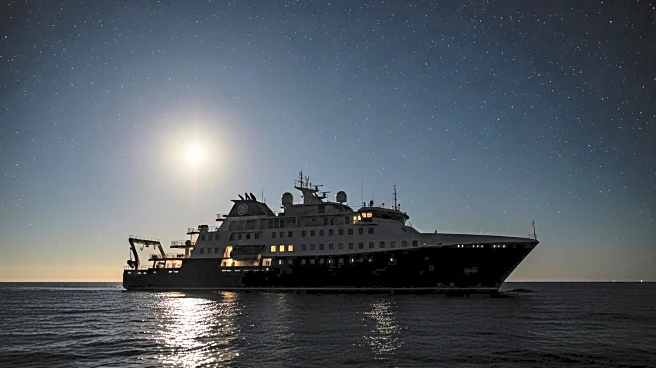What's Happening?
A research expedition aimed at exploring deep sea areas within Uruguayan waters has been interrupted due to technical issues with the research vessel Falkor (too). The vessel, owned by the Schmidt Ocean Institute, encountered a malfunction with its A-frame structure, which is crucial for deploying and recovering heavy underwater equipment. As a result, the vessel was forced to return to the Port of Montevideo for repairs shortly after departing on August 22. The expedition, named 'Uruguay SUB 200: Journey into the Unknown,' involved 37 scientists and technicians from 18 institutions across six countries. The mission was designed to study various aspects of marine ecology, underwater archaeology, deep-sea mapping, and marine geophysics. The vessel was expected to explore 50 points of interest on the seabed, ranging from 200 to 3,500 meters deep, and share live broadcasts of high-quality images captured by its remotely operated vehicle.
Why It's Important?
The interruption of the 'Uruguay SUB 200' expedition highlights the challenges faced in deep-sea exploration, particularly the reliance on advanced technology and equipment. The expedition was significant for its potential contributions to marine science, offering insights into underwater ecosystems and geological formations. The setback affects not only the scientific community involved but also the broader understanding of marine environments, which can inform conservation efforts and policy decisions. The malfunction underscores the importance of robust engineering and maintenance in scientific research vessels, which are critical for successful missions. The delay may impact the timeline for data collection and analysis, affecting stakeholders who rely on timely scientific findings.
What's Next?
The immediate next step involves repairing the Falkor (too) vessel to resume the expedition. The scientific team and stakeholders are likely to reassess the mission's timeline and objectives, considering the technical challenges encountered. Once repairs are completed, the expedition may proceed with its planned exploration activities, potentially adjusting its schedule to accommodate the delay. The incident may prompt discussions on improving the reliability and resilience of research vessels, ensuring that future missions can proceed without similar disruptions. Stakeholders, including the Universidad de la República and international scientific institutions, will be monitoring the situation closely to determine the feasibility of continuing the expedition.
Beyond the Headlines
The malfunction of the Falkor (too) vessel raises broader questions about the sustainability and reliability of technological advancements in ocean exploration. It highlights the need for continuous innovation and investment in research infrastructure to support complex scientific endeavors. The incident may also influence future funding and development priorities for oceanographic research, emphasizing the importance of technological resilience. Additionally, the expedition's interruption serves as a reminder of the unpredictable nature of scientific exploration, where unforeseen challenges can impact research outcomes and collaborations.











